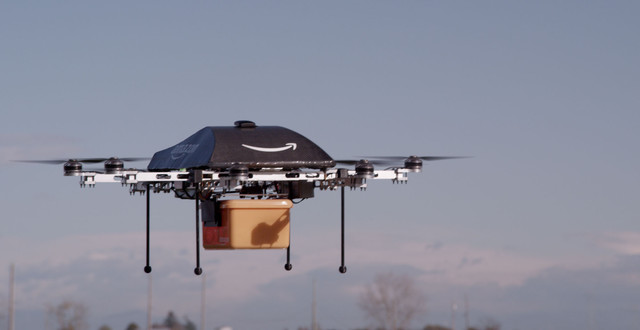Amazon.com Inc. (AMZN) is testing drones to deliver goods as the world's largest e-commerce company works to improve efficiency and speed in getting products to consumers.
Chief Executive Officer Jeff Bezos unveiled the plan on CBS's “60 Minutes” news program in the U.S., showing interviewer Charlie Rose the flying machines that can serve as delivery vehicles. Bezos said the gadgets, called octocopters, can carry as much as 5 pounds within a 10-mile radius of an Amazon fulfillment center. Amazon may start using the drones, which can make a delivery within 30 minutes, within five years pending Federal Aviation Administration approval, Bezos said.
“It will work, and it will happen, and it's gonna be a lot of fun,” he said in the “60 Minutes” interview broadcast yesterday.
Amazon, based in Seattle, has been introducing ways to get products to consumers faster, seeking to keep shoppers coming back to its web store instead of going to brick-and-mortar retailers. The company said last month it was teaming up with the U.S. Postal Service to begin Sunday delivery to members of its $79-a-year Prime program.
Delivery drones also are being used by the Australian company Zookal to deliver textbooks, said Oliver Lamb, director of Sydney-based Pacific Aviation Consulting. In China, the SF Express delivery company is experimenting with drones in the southern city of Dongguan, according to a report by the Civil Aviation Resource Net of China.
Regulatory Issues
“When and how to allow this kind of delivery is going to be a big question,” Lamb said. “Regulators will have to deal with this, and I'm sure each jurisdiction will come up with regulations to allow this in due course.”
Amazon's drone plan spurred Senator Edward Markey, a Democrat from Massachusetts, to issue a statement today saying the machines should be vetted before they are used for delivery. Markey introduced the Drone Aircraft and Privacy Transparency Act last month, calling for measures to ensure drones aren't used to spy on U.S. citizens.
“Before drones start delivering packages, we need the FAA to deliver privacy protections for the American public,” he said in the statement. “Convenience should never trump constitutional protections.”
New Uses
Experimentation with delivery by drones is part of a shift from the craft's use by the U.S. military to spy on and kill suspected terrorists.
The U.S. Congress has directed the FAA to develop a plan to integrate drones into U.S. airspace by 2015. That led U.S. venture investors to pour $40.9 million into drone-related startups in the first nine months of this year, more than double the amount for all of 2012, according to data provided to Bloomberg News last month by PricewaterhouseCoopers and the National Venture Capital Association.
As Amazon and EBay Inc. step up their push to get customers goods as quickly as possible, United Parcel Service Inc. (UPS) and FedEx Corp. (FDX) are focusing on developing and testing strategies for a same-day delivery market. Their efforts build off the ground networks that are the last link in a global chain that includes planes and trucks. The companies haven't discussed specific plans for using drones.
FedEx, UPS
Potential industrywide revenue from intracity delivery of small packages in the U.S. may be as much as $12 billion, FedEx has estimated. UPS, the world's largest shipping company, had total revenue of $40.5 billion through the first nine months of this year, while sales at FedEx, operator of the biggest cargo airline, totaled $44.3 billion in its fiscal year ended May 31.
“We have made a name for ourselves in innovation and technology,” FedEx Senior Vice President Patrick Fitzgerald said today in a Bloomberg Television interview. “This is something we have a lot of focus on. As it stands today, there are no drones in the delivery network.”
Carla Boyd, a FedEx spokeswoman, declined to comment further about drones. UPS said the technology won't be in use anytime soon.
“We certainly have had, in our technology steering committee, presentations from drone vendors,” UPS Chief Sales and Marketing Officer Alan Gershenhorn said in an interview today. “The commercial use of drones is certainly an interesting technology and we'll evaluate it ongoing.”
Developments that would allow commercial use of small drones “are pretty far off,” he said.
Blue Origin
Drones aren't the first futuristic technology to attract the interest of Bezos. Separate from Amazon, Bezos created a closely held spaceflight venture called Blue Origin, which in October said it planned to soon begin offering suborbital flights on a commercial basis.
The electric motors of the drones will help reduce the environmental impact of package deliveries, Bezos said.
“It's very green,” Bezos said. “It's better than driving trucks around.”
Still, the challenges to achieving a safe delivery at the end of the day may prove insurmountable, said Jeff Lowe, general manager of Asian Sky Group, a Hong Kong-based aviation consulting company.
“You'd have to make it idiot-proof,” Lowe said. “From a height, a 5-pound load hitting anything is going to be fairly destructive, so that can never happen. The first time it does, the FAA will ground all these drones and they will never fly again.”
Read more: Amazon Tests Drones for Same-Day Parcel Delivery, Bezos Says


